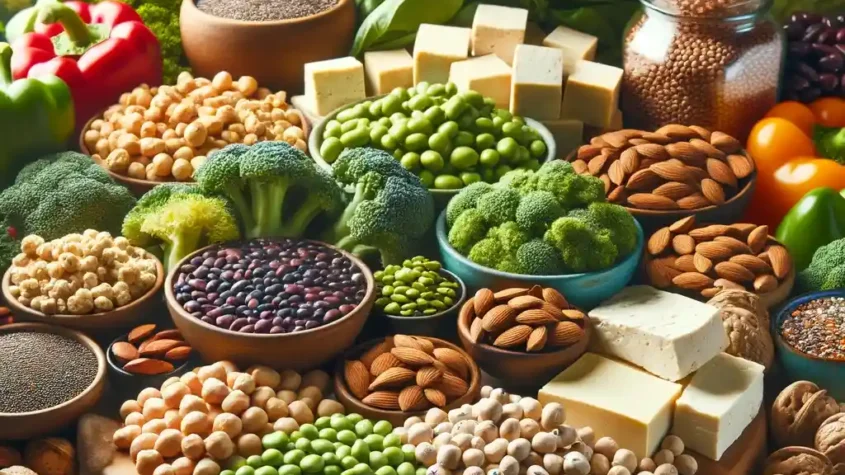
In recent years, the interest in vegetarian diets has surged, prompting many to seek effective plant-based protein sources. Exploring vegetarian protein options can provide health benefits while supporting sustainable eating practices. This article will highlight various sources of vegetarian protein that not only cater to dietary needs but also enhance overall nutrition. In this article, we will cover wellhealthorganic.com:vegetarian protein sources
Protein is an essential nutrient for the body, playing a crucial role in muscle repair, immune function, and hormone production. For individuals adhering to a vegetarian diet, it is vital to understand which foods can deliver adequate protein intake without relying on animal products. This post will detail the most nutritious vegetarian protein sources anyone can incorporate into their meals.
By focusing on whole foods like legumes, grains, nuts, and seeds, it’s possible to create balanced meals that fulfill daily protein requirements. Each source carries unique benefits, ensuring that vegetarians can enjoy diverse and satisfying diets. Discovering these options opens the door to tasty meals that nourish the body and support personal health goals.
Comprehensive Guide to Plant-Based Proteins
Plant-based proteins are abundant and varied, offering essential nutrients for vegetarian and vegan diets. Key sources include legumes, nuts, grains, soy products, and green vegetables. Each category presents unique benefits and can contribute significantly to daily protein intake.
Legumes and Beans: Nutritional Powerhouses
Legumes and beans such as lentils, chickpeas, black beans, and kidney beans are rich in protein, fiber, and essential vitamins. They typically contain about 15-25 grams of protein per cooked cup, making them an excellent choice for plant-based diets.
These foods also provide important micronutrients like iron, potassium, and magnesium. The high fiber content aids digestion and promotes satiety. Including a variety of legumes can enhance protein intake and support overall health.
Nuts and Seeds: Essential Amino Acid Sources
Nuts and seeds are nutrient-dense foods that offer protein, healthy fats, and various vitamins. Almonds, walnuts, chia seeds, and flaxseeds are popular options, each delivering between 5 to 8 grams of protein per ounce.
These foods also provide essential fatty acids, which are crucial for brain health. Nuts and seeds can be easily added to salads, smoothies, or taken as snacks, offering versatile usage in various meal preparations.
Whole Grains: More Than Just Fiber
Whole grains such as quinoa, brown rice, and barley provide a moderate amount of protein, usually around 6-8 grams per cooked cup. They are also rich in complex carbohydrates, making them a good energy source.
Incorporating whole grains into meals contributes to a balanced diet and supports digestive health due to their high fiber content. Substituting refined grains with whole grains helps improve overall nutrition and enhances feelings of fullness.
Soy Products: Versatile Protein-Rich Foods
Soy products like tofu, tempeh, and edamame are excellent sources of complete protein, containing all essential amino acids. Tofu boasts approximately 20 grams of protein per cup, while tempeh packs even more, around 30 grams.
These products are incredibly versatile and can be grilled, stir-fried, or added to soups and salads. Furthermore, they are also rich in calcium, iron, and antioxidants, making them a valuable addition to both vegetarian and vegan diets.
Green Vegetables: Hidden Protein Gems
Green vegetables, while not typically recognized for their protein content, still provide valuable servings. Foods like spinach, broccoli, and Brussels sprouts can contribute between 2 to 5 grams of protein per cooked cup.
In addition to protein, these vegetables are rich in vitamins A, C, and K, as well as fiber. Including a variety of these greens in meals can help enhance both nutrient intake and the overall quality of the diet.
Optimizing Vegetarian Protein Intake
Maximizing protein intake is essential for individuals following a vegetarian diet. By strategically combining food sources and utilizing supplements when necessary, they can effectively meet their protein needs.
Balancing Meals with Complementary Proteins
Complementary proteins are two or more protein sources that, when consumed together, provide a complete amino acid profile. This is particularly important for vegetarians, as most plant proteins lack one or more essential amino acids.
Examples of complementary pairings include:
- Rice and beans
- Peanut butter on whole grain bread
- Hummus with pita bread
Incorporating these combinations into meals can help ensure a balanced intake. Varying protein sources, such as legumes, grains, nuts, and seeds, enhances nutritional diversity. It is advantageous to include different sources throughout the day rather than trying to consume complete proteins in a single meal.
Understanding Protein Digestibility
Not all protein sources are created equal. Protein digestibility refers to how effectively the body can break down and utilize the protein consumed. Factors influencing digestibility include the source of protein, preparation methods, and individual digestive health.
Animal proteins generally have higher digestibility scores compared to plant proteins. However, specific plant-based foods, such as soy, quinoa, and chia seeds, have high digestibility rates. Cooking methods like boiling, soaking, or sprouting can also improve the digestibility of legumes and grains, making the amino acids more accessible to the body.
Plant-Based Protein Supplementation Options
For those struggling to meet their protein requirements through food alone, plant-based protein supplements can be beneficial. Various options are available, giving individuals flexibility in their diet.
Common plant-based protein supplements include:
- Pea protein: A good source of BCAAs (branched-chain amino acids) that supports muscle growth.
- Brown rice protein: Easy to digest and hypoallergenic.
- Hemp protein: Contains omega-3 fatty acids along with protein.
When selecting a protein supplement, it is crucial to consider the ingredient list, amino acid profile, and any potential allergens. These supplements can effectively complement a balanced vegetarian diet, providing a convenient way to boost protein intake.
Standing Desk Canada: The Ultimate Guide to Your Workspace Upgrade
Standing desks have gained significant popularity in Canada as more individuals look to im…









